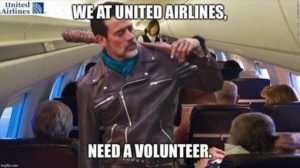 By now, most people have heard of the passenger on a United Express flight that was bloodied and forcibly removed from a flight in Chicago so that airline employees could make it to Louisville to support another flight there.
By now, most people have heard of the passenger on a United Express flight that was bloodied and forcibly removed from a flight in Chicago so that airline employees could make it to Louisville to support another flight there.
The event has caused a public relations nightmare for United, whose CEO initially defended his employees actions. But with the PR problems mounting due to several disturbing videos other passengers took with their cell phones, the CEO did a 180 and later apologized.
As someone who has flown hundreds of times over the last 40 years, I am particularly interested in this situation. Over that time I have witnessed the coarsening of our culture, and any misbehavior I have seen on flights has almost always been on the part of passengers. Flight attendants generally have to endure abuse with a smile on their face.
In this case, we have a medical doctor who refused to de-plane, and security was called. He acted immature, for sure, and in the process of forcibly removing him from his seat, his head was slammed against an armrest.
So why is this case different?
Because the man had a legal right to keep his seat.
Under United’s Contract Of Carriage (COC) rules (which follow federal rules), a passenger may only be bumped from a flight before they board (Rule 25). After they have taken their seat, Rule 21 is in effect, which would allow security to forcibly remove the passenger for many reasons — none of which includes accommodating last minute needs for a seat for other airline employees (or even overbooking).
The flyer is in a contractual relationship with the airline, and each has rights and responsibilities under that contract. United Express violated the terms of the contract, and injured the passenger in the process.
But doesn’t federal law require passengers to follow all crewmembers’ instructions?
One might argue, ok, so they shouldn’t have forced the passenger to de-plane… but by federal law he has to comply.
Well, what if a flight attendant approaches a young lady who has just taken her seat, and says, “I’m sorry, m’am, but I’m going to have to ask you to stand up and take your clothes off.”
“Excuse me?”
“Take your clothes off, m’am. Either obey our instructions, or you are in violation of federal law.”
Well, that’s just ridiculous, you might protest. It has nothing to do with the safety of the flight.
Exactly. And neither did the passenger who was forcibly removed from the United Express flight.
I know that the doctor has a shady history. He lost his license to practice medicine in Kentucky. He acted in an immature manner, and did not comply with even security personnel instructions.
But those issues are irrelevant. He was being told to do something in violation of the contract he had with the airline.
Now, the airline will pay.
I’m sure there will be an out-of-court settlement. The bigger hit on United will be its reputation, though, which will impact its business and its stock value.
I wouldn’t be surprised if we see more lawsuits. What about an executive who was told to vacate his seat, and as a result he didn’t make an important meeting and his company lost out on a multi-million dollar contract? I’m sure there will be all kinds of people who have suffered harm because airlines have not been following federal rules regarding removing passengers from a flight.
But if those airline employees didn’t make it to Louisville, a flight might have been cancelled!
The reason this whole thing went downhill is that the airlines have gotten used to intimidating passengers. They believe they have the right to remove someone from their seat for any reason they want, with minimum financial compensation, including needing the seat for employees or because of overbooking. Now we know that’s not true.
All United Express had to do was bump up the financial incentive to give up a seat. The offer was at $800, and going to the $1,350 “limit” would have fixed the problem. Julian Simon was the one who came up with the seat-auction system, and it should be used as intended… not circumvented by intimidating passengers with threats of violations of federal law.
The United employees would have made it to Louisville, without a major incident.
You can bet executives at every airline are in meetings this week, reviewing the Contract Of Carriage rules (with their lawyers), and passing the word down the management chain to never let this happen again.
Under the current rules, there was no reason for it to happen in the first place. It happened because of bad management.
 You would think that since it’s almost May that one could plan a march against global warming without having to worry about getting snowed on.
You would think that since it’s almost May that one could plan a march against global warming without having to worry about getting snowed on.
 Home/Blog
Home/Blog










